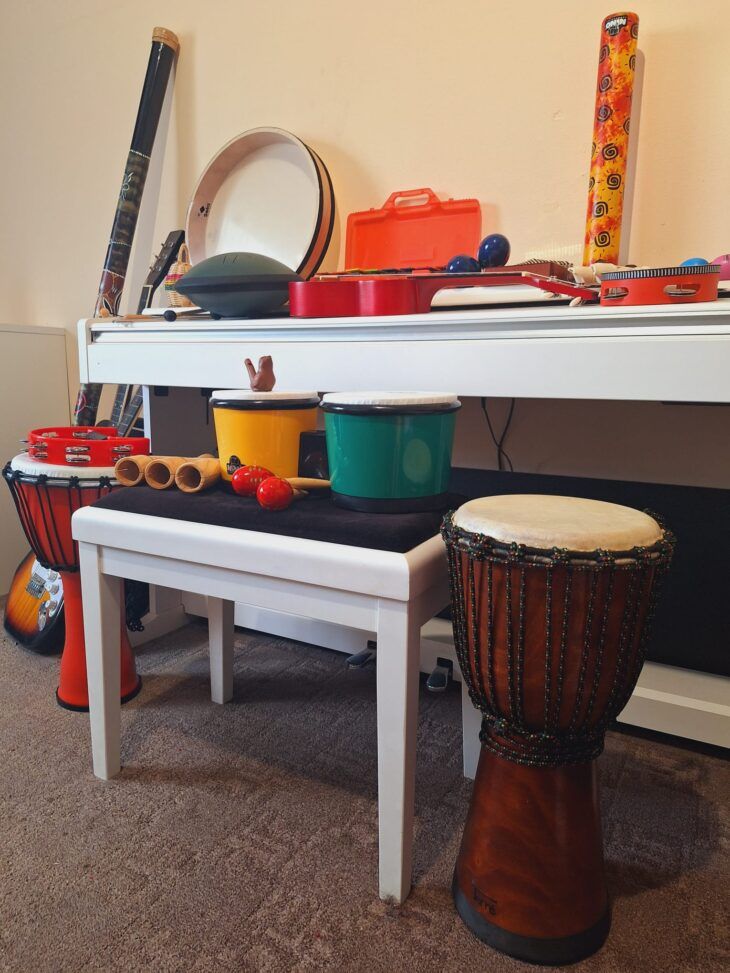Beatrice’s Story
Romania
- Children
- Disability
- Adults
- Caregivers

Read this post in Romanian.
Beatrice, thank you for taking the time to answer these questions.
- You were not trained by Music as Therapy International to use music, when and who taught you to use music with children with disabilities?
During my university studies, majoring in Musicology and later in Music Therapy, I developed a curiosity about the field of Music Therapy, knowing that it remains relatively unexplored in Romania. I started working with children with autism spectrum disorders, drawing on my theoretical knowledge of music and music education. As I gained practical experience through the use of active music therapy methods, I noticed that music therapy offers an engaging and supportive environment for children with special needs. They feel safe and confident in the therapeutic context, allowing them to express themselves through instruments and voice.
After attending a workshop led by Mrs. Monika Szabo, along with other music therapy workshops and an internship at a clinic in Germany, I realized the importance of applying active music therapy methods with children with special needs and documenting the benefits of music therapy throughout the intervention process. These efforts culminated this year in a doctoral dissertation.
- What inspires you about using music with children?
From my earliest musical interactions with the children, I observed their responsiveness to musical elements, their enjoyment of singing together, and their enthusiasm for instrumental improvisation. The joy and excitement they experience during these musical moments are palpable. Every time I see them smile or laugh during our musical exchanges, I feel the same positive energy, which motivates me to continue providing them with a nurturing environment for their emotional, social, physical, and musical growth.
- Why did you decide to apply for new musical instruments?
I decided to apply for additional musical instruments in the hope of expanding my practice to more institutions.
- What does having new instruments mean to you?
Having more instruments now allows me to manage multiple projects simultaneously.
- What do you hope to use the instruments for?
I hope the instruments will benefit both the recipients who enjoy them and my students, whom I supervise during their music therapy practice.
- Who are the people/beneficiaries you intend to use the instruments with (and how many beneficiaries)?
The beneficiaries of the music therapy sessions where I use the instruments include adults diagnosed with anxiety and depression (approximately 12 participants per group session) and children with special needs, particularly those diagnosed with autism spectrum disorders and attention-deficit hyperactivity disorder (ADHD). The sessions include both individual and group settings, currently involving 10 children.
- How will the instruments benefit your work and the people/beneficiaries you will use them with?
The instruments play a key role in facilitating musical activities aimed at developing motor skills, communication abilities, emotional competence, cognitive functions, and the musicality of children with special needs. Additionally, the instruments will support group sessions where children and adults can interact and communicate through music, fostering improved social relationships and enhancing self-esteem.
- What musical activities do you hope to try with the new musical instruments? Can you explain in detail how at least one of the activities works?
The musical activities I design for the children’s sessions are based on group singing and instrumental accompaniment, incorporating musical games that involve turn-taking, alternating roles, or the “call-and-response” model, where each participant has the chance to express themselves while also following musical cues like changes in dynamics, rhythm, meter, or tempo. These activities also help the children improve their pronunciation through singing and develop an understanding of rules and the general concept of structure.
Vocal and instrumental improvisation, whether rhythmic or melodic, in group sessions with adults suffering from anxiety and depression, along with group singing, will help enhance their quality of life, build confidence in their abilities, and reduce feelings of isolation.
Beatrice Iordache
